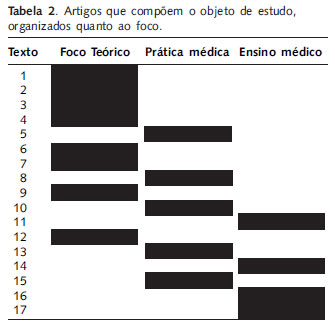The problem that motivated the present study was the difficulty in dealing with mental distress at primary healthcare units. In this study, we investigated whether this difficulty was due to epistemological deficiencies of the hegemonic paradigm. We reviewed the literature and analyzed the use of the term paradigm in recent Brazilian scientific articles. After searching using the keywords paradigm and medicine and making a preselection, 17 texts were chosen. The analysis was done in two stages: linguistic analysis and surveying of emerging themes. We surveyed the fifty most commonly used words and grouped them into communities of co-occurrence using the Clauset algorithm. The texts discussed Kuhn's ideas and presented innovative experiences already implemented in healthcare units and examples of curricular changes in medicine courses. Health promotion appeared as a new and promising paradigm for healthcare.
Paradigm; Medicine; Mental distress; Primary care; Health promotion





